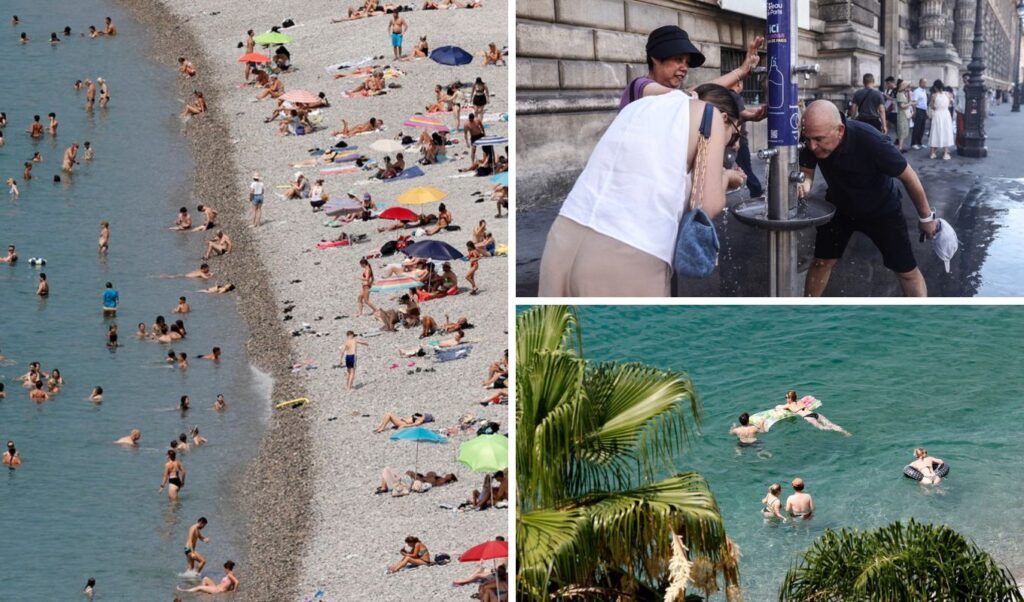The heat wave that has been tormenting Europe for days is breaking all temperature records, with the mercury reaching and exceeding 45 degrees Celsius in many areas of the Iberian Peninsula. At the same time, the impacts of climate change are becoming increasingly evident. From southern Spain and Portugal to France, Italy and the Balkans, Europeans are being called upon to face extreme and dangerous heat wave phenomena that threaten public health.
Read: Heat wave: Europe “burns”: Paris on red alert – Spain, Italy, Germany on standby
Red alert in France due to heat wave
Eight departments in France, including Paris and neighboring areas, were placed on red alert due to the impending heat wave. The meteorological service warns of particularly high and stifling temperatures, especially in the French capital region.
The red alert, the highest level of health warning, means authorities will take measures to protect public health by restricting certain activities. In Italy, a 47-year-old owner of a small construction company died outside Bologna while working under the sun on a school building construction site. This is the first death attributed to this year’s heat wave hitting the country.
Temperature records in the Iberian Peninsula
Temperatures in the Iberian countries, Spain and Portugal, are recording historic highs with the mercury reaching 46.6°C in Portugal, breaking the previous record. In Spain, temperatures touched 46°C, marking one of the hottest Junes ever recorded in the region.
As meteorologists point out, this phenomenon is not simply an exceptional case, but another sign of climate change impacts. The Iberian Peninsula is experiencing the most intense heat wave of recent decades, with extreme temperatures affecting daily activities and endangering vulnerable population groups.
Climate change and extreme temperatures in Europe
Extreme temperatures are rising at rates exceeding expected seasonal normality, while this year’s summer temperatures follow the trend of recent years. 2024 is recording the highest temperatures in European history, surpassing 2023, 2022, and 2021.
Climate changes are not only cumulative but affect the duration and frequency of heat waves. Simultaneously, Mediterranean temperatures have reached levels that could cause marine heat waves, further intensifying extreme land temperatures.
Impacts on wildlife and glaciers
The impact of this extreme heat is not limited to humans and cities. In the French Alps, the frost line rose to an altitude of 16,850 feet (approximately 5,130 meters), while snow that usually remains for months has largely melted already by June.
Wildlife is also affected, as native organisms struggle to adapt to these extreme conditions, and glaciers continue to retreat at rates questioning their future existence. Nature photographer Guillaume Laget, who posted images from La Meije, stated that “it looks like the end of August, even though we’re only in late June.”
Forecasts for the coming days in Europe
The heat wave is expected to continue throughout the week, with regions like France and Italy experiencing its peak in the coming days. Temperatures will reach 38°C, with excessive heat moving eastward toward the Balkans and Eastern Europe.
Cold fronts are also expected later in the week, which will slightly reduce the heat wave intensity, but the phenomenon remains worryingly intense. The future forecast is grim, as some scientists warn that summer conditions in 2025 may exceed last year’s.
The challenge of extreme weather phenomena
The continued temperature increase in Europe is not only a warning for summer 2025 but for the decades that follow. European governments are called upon to take action to limit greenhouse gas emissions and strengthen societal resilience.
Heat wave impacts include:
• Risk to public health and vulnerable groups
• Threat to agricultural crops and productivity
• Destruction of ecosystems dependent on mild climate conditions
• Increased energy consumption for air conditioning
Climate change, while appearing to be a distant threat to some, is a reality we are all called to face with action and responsibility. The heat wave hitting Europe and the Iberian Peninsula represents another danger signal for the planet’s future.




